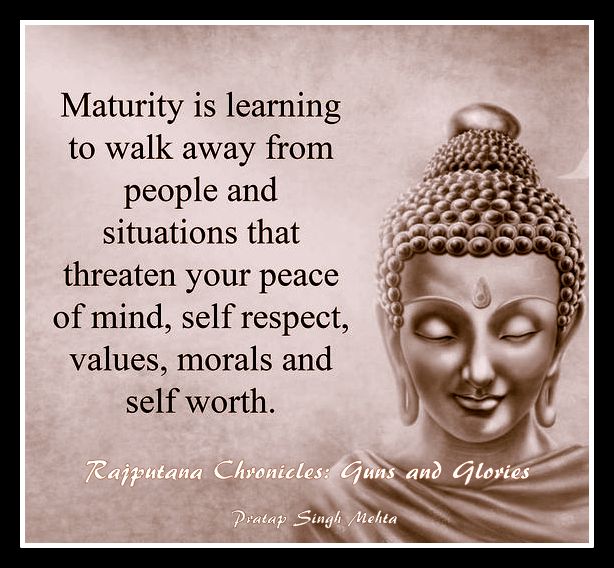Should You Allow People and Circumstances to Control Your Life?
~Do you allow people and circumstances control your life, moods, and state of mind?
~How do you react, when you have an overbearing guest?
~How do you feel, if your boss criticizes your work, or tells you something you don’t like?
In these and similar situations, do you, keep thinking about the incident? Do you get angry, unhappy or frustrated?
This happens to almost everybody, almost every day. We don’t always have control over circumstances and situations. This is how life is.
From Rajputana Chronicles: Guns and Glories – Acharya Jinchand Suri, guru of Dewan Karam Chand, once remarked in the court of Emperor Akbar at Lahore,

“We don’t have control over people’s words, and we don’t have control over people’s behaviour, but we can teach ourselves to react differently. We can learn to act and react, emotionally and mentally, in a different way. We can learn to choose our reactions and behaviour. We can learn to remain detached and unaffected.”
Tolerate with Acceptance & Understanding
According to Vedanta, tolerance comes with the knowledge that each soul is different from us. Their thoughts, feelings, perceptions are different from us. Their sanskars and karmic accounts were created on the journey of different births in different environments facing different situations. So, we cannot question other’s behaviour or sanskars. This understanding helps us accept people as they are. We reach a point where we easily tolerate different sanskars. We reach a stage where there is no feeling of having to tolerate.
Sister Shivani of Brahm Kumari says,
“Power to Tolerate means we live and work with people with the understanding that different sanskars is the natural way to be. We do not waste our energy or get agitated thinking – why are they this way, how can they be like this. We do not try to control them or force them to change. We inspire and empower them, and they chose to change what they find uncomfortable about themselves.”
Workshop Exercises:
Let us make a list of simple habits of people which we have not been able to tolerate so far.
It is only a programming of our mind as we always told our self we cannot tolerate something or someone. Today let us create a thought – I accept this sanskar of theirs and from now their sanskar will not create any disturbance in my mind.
First-Aid Solutions for Beginners
There are several things you can do, when you are in one of the above-mentioned situations, which can help you loosen the effect of people and circumstances on you. These are first-aid steps, and some of them are well known:
- Breathing deeply a few times, before reacting.
- Trying to replace your thoughts with positive thoughts.
- Relaxing your body.
These, and many similar tips are helpful, but sometimes, when in such a situation, you might not remember what to do, or the feelings, anger and reactions are too strong, not allowing you to do something about them.
Solutions for Advance Learners – Emotional Detachment
There is an effective method, but it requires some learning. This is emotional detachment. Developing a certain degree of emotional detachment can make great changes in everyone’s life.
When you can express emotional detachment in the above-mentioned situations, in a natural way, with no effort, it becomes second nature. You will gain a sort of inner strength and calmness, unaffected by outside sources.
Emotional detachment protects you from being upset by external conditions or situations. It does not necessarily change your circumstances, but it allows you to act and react calmly and with common sense, without emotional agitation, which often clouds the judgment and wastes unnecessary emotional and physical energy.
Here are a few useful tips for emotional detachment:
- Practice letting go.
- Substitute your negative thoughts, fears, and worries, with happy and positive thoughts.
- Learn to observe your thoughts and feelings. In time, this will enable you to detach from unwanted thoughts, feelings and reactions.
- Learn to loosen your attachment to unpleasant memories and the past.
- Avoid people that depress you, let you down, or unjustly criticize you.
Developing emotional detachment teaches me to free myself from the emotional control of people and circumstances. It is a simple, and easy to follow.
Power to tolerate is our ability to remain internally unaffected when situations and people are not our way.

6 thoughts on “Should You Allow People and Circumstances to Control Your Life?”
Dear sir,
I thoroughly enjoyed reading your articles. Talking about emotional detachment is something that I will always remember….my dad used to always tell me as part of life lesson but I never understood back then. I was too young to really understand what he said….but now I do. As you said “loosening the attachment” does really help.
You are amazing Sir…
Regards
Deepa
Thanks Deepa. There is a subtle difference between ‘love’ and ‘attachment’. Love is selfless. One overlooks the shortcomings when they are in love.There is is no possessiveness. On the other hand, attachment is also love but one becomes possessive and hence can not tolerate shortcomings. Love and regards.
Love the sensitive and beautiful article. Another word for emotional detachment could be acceptance.
Thank you for warm appreciation Shalini. Well explained emotional detachment..
Dear PSM sir,
When one can achieve this highest quality in oneself “We can learn to act and react, emotionally and mentally, in a different way. We can learn to choose our reactions and behaviour. We can learn to remain detached and unaffected.”
> then they had achieved to handle ones situations and people positively.
Though many people know about this theoritically many fail to handle this way , including me.
Time to time this is reminder to all whomever reads this who wanted to turn them positive. I loved the first aid solution. Thank you.
Sundari… beautifully summarised and well understood. Thanks.